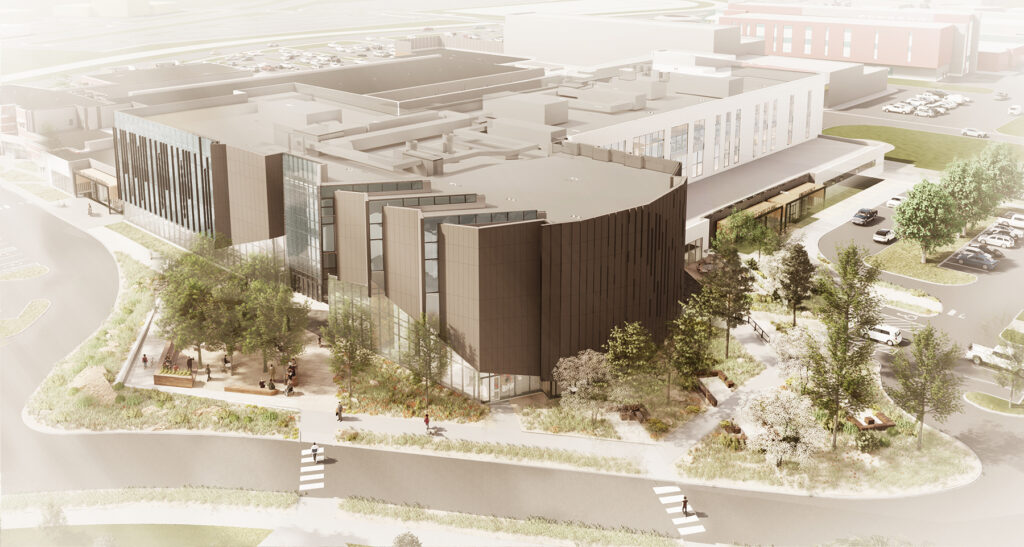VETERINARY PACESETTER
Facility and curricular upgrades underway at CSU vet school

June 6, 2024
Illustrations by Clark & Enerson
A major construction project underway at CSU in Fort Collins will improve training for students in the university’s highly regarded Doctor of Veterinary Medicine Program – the nation’s No. 2 veterinary school – by allowing the school to admit more students, modernize its curriculum, and provide primary care for more pets in the community.
Construction of phase one of the newly named Veterinary Health and Education Complex began in Fall 2023 and is expected to be complete in 2026. Estimated cost of the project is $230 million; that budget will be fulfilled through bond financing, a state of Colorado allocation of $50 million, and philanthropy, said Dr. Sue VandeWoude, dean of the CSU College of Veterinary Medicine and Biomedical Sciences.
“This project will expand access for both students and patients, and our futuristic curriculum will set CSU up to deliver the highest quality veterinary education for decades,” VandeWoude said.
The project will more than double the footprint of the James L. Voss Veterinary Teaching Hospital, which was built in 1978 and anchors Colorado State University’s South Campus. Much of the growth will come in the addition of classroom and laboratory facilities that will join students in all four years of the veterinary program at a single site; currently, students in the program’s first two years study on CSU’s Main Campus, then complete two years of clinical training at the teaching hospital.
The facility growth will lead to enrollment growth: The Doctor of Veterinary Medicine Program expects to begin admitting about 170 students per year, compared to present class sizes of about 140, VandeWoude said. The vet school annually receives more than 3,000 student applications.
That enrollment growth, amounting to more than 20 percent, will help address veterinary shortages that have become pronounced in many parts of the country and that have been acute in some rural communities, where livestock medicine is critical to animal welfare and the economy.
Curricular changes will center on significantly more hands-on, team-based, and case-based learning, similar to the approaches being adopted by many professional schools, VandeWoude said.
“We’ve really put together a dream curriculum,” said Dr. Matthew Johnston, professor of avian, exotic, and zoological medicine and co-chair of the college’s curriculum renewal committee. “This will be the most progressive veterinary curriculum in the world.”


Among other new teaching facilities, a new wing of the Veterinary Health and Education Complex will be devoted to primary care – providing pets with checkups, vaccinations, spay and neuter surgeries, and other types of routine and preventive care.
Students in their final stages of veterinary training will manage the primary care clinic and its cases with guidance from faculty veterinarians. The changes will allow students to perform four times the current number of basic surgical techniques, better preparing them for practice immediately upon graduation. Meantime, the expanded primary care clinic will offer more general pet care for the community.
“The new clinic will allow our students to gain more confidence in the types of procedures and interactions they’re going to be called upon to do most commonly in private practice,” VandeWoude said.
Phase one of the Veterinary Health and Education Complex also includes construction of a new $13-million livestock veterinary hospital adjoining the Johnson Family Equine Hospital.
A second phase of construction will upgrade existing facilities at the Veterinary Teaching Hospital and likely will have a budget in the range of $100 million, VandeWoude said. The hospital houses 28 veterinary specialties and tallies some 42,000 patient visits per year. Specialty services for large and small animals include cardiology, dermatology, neurology, oncology, and surgical care, among many other services. A wide range of clinical research is also undertaken at the veterinary hospital.
Colorado State’s Doctor of Veterinary Medicine program is the only veterinary school in the Intermountain West and is ranked No. 2 in the nation, behind the University of California, Davis, by U.S. News & World Report.
SHARE
